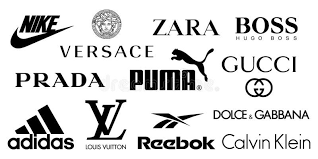Building Strong Brands: The Key to Success in Today’s Market
The Power of Brands: Building Strong Connections
In today’s competitive business landscape, brands play a crucial role in shaping consumer perceptions and driving purchasing decisions. A brand is more than just a logo or a product; it is the essence of what a company stands for and how it is perceived by its target audience.
Successful brands have the power to create emotional connections with consumers, building trust and loyalty over time. They evoke certain feelings and associations that resonate with customers, influencing their choices and preferences.
Building a strong brand requires consistency, authenticity, and a deep understanding of your target market. It involves crafting a compelling brand story, defining your unique value proposition, and communicating your brand message effectively across various touchpoints.
Brands that resonate with consumers are able to differentiate themselves from competitors, command premium pricing, and attract a loyal customer base. They become symbols of quality, trustworthiness, and innovation in the minds of consumers.
Brand building is an ongoing process that requires continuous investment in marketing efforts, customer engagement, and brand experience. It involves listening to customer feedback, adapting to market trends, and staying true to your brand values.
In today’s digital age, brands have more opportunities than ever to connect with consumers through social media, content marketing, influencer partnerships, and other digital channels. These platforms allow brands to engage with their audience in real-time and create meaningful interactions that strengthen brand loyalty.
Ultimately, the power of brands lies in their ability to create lasting relationships with consumers based on trust, authenticity, and shared values. By investing in building a strong brand identity and delivering exceptional customer experiences, companies can position themselves for long-term success in an increasingly competitive marketplace.
Exploring Top Brands: Frequently Asked Questions on Global Brand Rankings and Types
- What is the top 10 biggest brand in the world?
- What are the top name brand?
- What brands are popular?
- What are a companies brands?
- What is the top 10 brand?
- Which is the No 1 brand?
- What are the 7 types of brand name?
- What are the 4 types of brand?
- What are the best clothing brands?
What is the top 10 biggest brand in the world?
One frequently asked question about brands is, “What are the top 10 biggest brands in the world?” This question reflects a curiosity about the most influential and successful brands that have made a significant impact on global markets. The ranking of the top 10 biggest brands often includes well-known names across various industries, showcasing their strong brand presence, market value, and consumer recognition on a global scale. These brands serve as benchmarks for excellence in branding strategies and customer engagement, setting high standards for others to aspire to in building their own brand reputation and success.
What are the top name brand?
When asking about the top name brands, it’s important to consider that brand rankings can vary based on different factors such as industry, region, and consumer preferences. Some globally recognized top name brands include Apple, Google, Amazon, Coca-Cola, and Nike. These brands have established strong market presence, loyal customer bases, and a reputation for innovation and quality. However, it’s essential to remember that the perception of top name brands can be subjective and may change over time as new brands emerge and consumer preferences evolve.
What brands are popular?
The popularity of brands can vary greatly depending on the industry, region, and target audience. In the fast-paced world of consumer preferences, certain brands may rise to prominence due to their innovative products, strong marketing campaigns, or cultural relevance. Brands like Apple, Nike, Coca-Cola, and Amazon are often recognised globally for their widespread popularity and market influence. However, it’s essential to note that brand popularity is subjective and can shift over time as consumer trends evolve and new players enter the market. Conducting market research and staying attuned to consumer preferences are key factors in understanding which brands are currently popular in a specific context.
What are a companies brands?
A company’s brands refer to the unique identities and representations associated with its products or services. Brands encompass more than just logos and names; they embody the values, reputation, and experiences that consumers associate with a particular company. A company’s brands serve as a promise to customers, conveying quality, reliability, and differentiation from competitors. By effectively managing and nurturing their brands, companies can build strong connections with consumers, foster brand loyalty, and ultimately drive business success in a competitive market.
What is the top 10 brand?
The question “What is the top 10 brand?” often arises when seeking information about the most influential and successful brands across various industries. The answer to this question can vary depending on the criteria used, such as brand value, revenue, market share, or consumer perception. Some commonly mentioned brands in top 10 lists include global giants like Apple, Google, Amazon, Microsoft, Coca-Cola, and Samsung. These brands are renowned for their innovation, customer loyalty, and market dominance, making them key players in shaping consumer preferences and setting industry standards.
Which is the No 1 brand?
The question “Which is the No 1 brand?” is a common inquiry that reflects the curiosity and interest people have in identifying the most prominent and successful brand in a particular industry or globally. The answer to this question can vary depending on different metrics such as brand value, market share, customer loyalty, and overall brand perception. Brands like Apple, Google, Amazon, and Coca-Cola are often considered top contenders for the title of the number one brand, each excelling in different aspects that contribute to their overall success and recognition in the market. Ultimately, determining the No 1 brand involves a complex evaluation of various factors that contribute to a brand’s influence and impact in its respective industry.
What are the 7 types of brand name?
When considering brand names, it is essential to understand the different types that can be used to effectively communicate a brand’s identity and values. The 7 types of brand names commonly recognised in branding are: descriptive names, suggestive names, compound names, arbitrary names, fanciful names, coined names, and hybrid names. Each type has its unique characteristics and can influence how consumers perceive and engage with a brand. Selecting the right type of brand name is crucial in creating a strong brand presence and establishing a memorable identity in the minds of consumers.
What are the 4 types of brand?
There are four main types of brands that companies can develop to differentiate themselves in the market: product brands, service brands, retail brands, and personal brands. Product brands are associated with specific products and focus on their unique features and benefits. Service brands emphasize the quality and reliability of services offered by a company. Retail brands represent a specific retailer or store chain and its distinct shopping experience. Personal brands are built around individuals, showcasing their expertise, personality, and values to create a strong personal reputation. Each type of brand serves a different purpose and requires tailored strategies to effectively engage with target audiences.
What are the best clothing brands?
When it comes to the question of “What are the best clothing brands?” the answer can vary greatly depending on individual preferences, style, and budget. The concept of a “best” clothing brand is subjective and can be influenced by factors such as quality, design aesthetic, sustainability practices, and brand reputation. Some popular clothing brands known for their quality craftsmanship and timeless designs include luxury labels like Gucci, Chanel, and Prada. On the other hand, there are also emerging sustainable fashion brands like Everlane, Reformation, and Patagonia that are gaining popularity for their ethical practices and eco-friendly materials. Ultimately, the best clothing brand for one person may not be the same for another, as personal style and values play a significant role in determining what constitutes the “best” brand for an individual.




